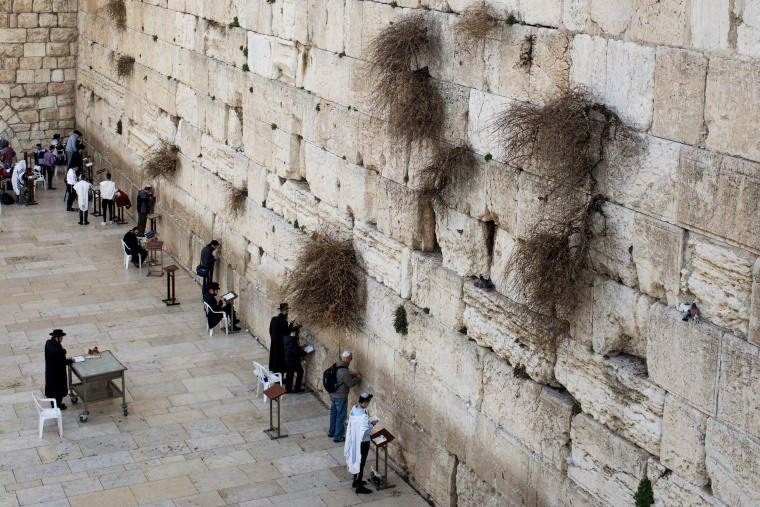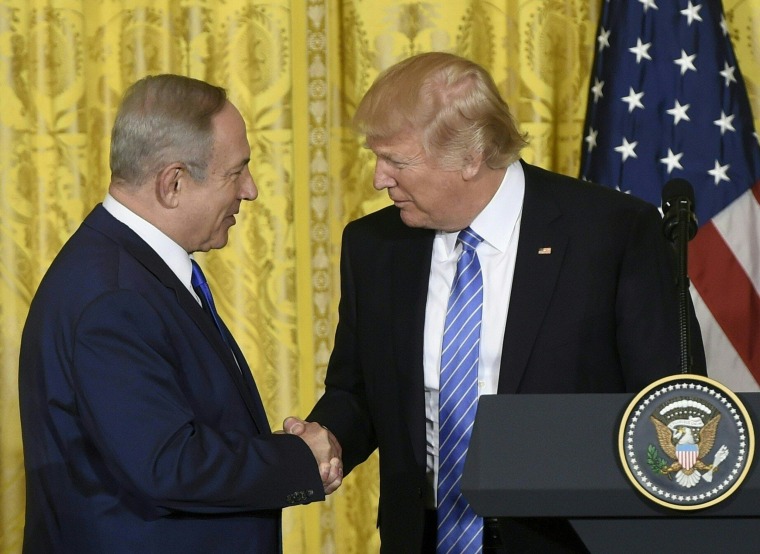TEL AVIV, Israel — President Donald Trump’s two-day visit to Israel, which begins Monday morning, should have been the easiest stop in his first overseas trip.
After all, he ran a pro-Israel campaign and his election was welcome news in Israel. Trump’s decision to tap three Orthodox Jews — Ambassador David Friedman, son-in-law Jared Kushner, and adviser Jason Greenblatt — only solidified their favor. “We do not have a greater friend than Donald Trump,” Israeli Prime Minister Benjamin Netanyahu told reporters after a meeting with the president at the White House in February.
But now Trump, who left a firestorm of political controversy back home, finds his troubles aren't limited to the domestic front.
From compromising Israeli intelligence to backtracking on a promise to move the U.S. Embassy from Jerusalem to Tel Aviv to a diplomatic scuffle over the Western Wall, Israel’s once-clear support of the Trump administration is less certain.
1. Compromising Israeli Intelligence
On Tuesday, three government officials told NBC News that Israel had been the source of ISIS-related intelligence about a laptop bomb threat that Trump had given Russian Foreign Minister Sergei Lavrov.
The link to Israel, first reported by The New York Times, came a day after it was disclosed that the president had passed on the information during a meeting with Lavrov at the White House two weeks ago.
National Security Adviser H.R. McMaster told reporters last week that Trump’s disclosure was “wholly appropriate.”
In response, Israeli Defense Minister Avigdor Liberman, said, "The security relationship between Israel and our greatest ally the United States, is deep, significant and unprecedented in volume.”
But former chief of the Israeli intelligence, Danny Yatom, told a Tel Aviv radio station that, if true, Trump’s disclosure was likely to cause “heavy damage” to Israeli and American security, especially if it reaches the Iranians. “There will be a loss of faith between the intelligence services,” he said.
2. The Western Wall
Then, in what should have been a historic win, the White House announced that Trump will be the first sitting President to visit the holy site of the Western Wall in Jerusalem. But his administration’s inability to agree on whether the wall was located in Israel led to yet another diplomatic blunder.
Also, according to Israel's Channel Two News, U.S. representatives in Jerusalem turned down a request to have Netanyahu tag along with Trump, saying the president was making a "private" visit to the Western Wall.

"This isn't your territory," one of the American reps reportedly told the Israelis. "This is in the West Bank. It is a private visit by the president, and it's not your business."
The statement roiled the Israelis, who asked the Trump administration for clarification. "They (the comments) do not reflect the U.S. position, and certainly not the president's position," a White House spokesman said.
3. Moving the U.S. Embassy
Adding to the tensions is the uncertainty over where the U.S. will have its embassy.
Last September, then-candidate Trump pledged to Netanyahu “that the United States, under a Trump administration, will finally accept the long-standing Congressional mandate to recognize Jerusalem as the undivided capital of the State of Israel.” Tied to Trump’s assurance is the promise to move the U.S. embassy to Jerusalem.
The United States has kept its embassy in Tel Aviv since Israel was founded in 1947 because Jerusalem is considered disputed territory between Palestinians and Israelis and considered the capital for both. However, since 1995 when Congress passed a law mandating the embassy be moved to Jerusalem, every six months the president has had to sign a waiver delaying the move for reasons of national security. The most recent waiver expires June 1, just a little over a week after Trump’s visit.
Recently, the administration has become more cautious in its comments about relocating the embassy.
"The president, I think rightly, has taken a very deliberative approach to understanding the issue itself, listening to input from all interested parties in the region, and understanding what such a move, in the context of a peace initiative, what impact would such a move have," Secretary of State Rex Tillerson told "Meet the Press" host Chuck Todd recently.
4. “The Ultimate Deal”
Yet, despite all of the current tensions, Trump still believes he can broker “the ultimate deal” between the Israelis and Palestinians.
He told Palestinian Authority President Mahmoud Abbas earlier this month that he had heard "that perhaps the toughest deal to make" is the one between Israel and Palestine but said he felt his administration had a “very, very good chance" to get it done.
“Let's see if we can find the solution. It's something, frankly, maybe not as difficult as people have thought over the years. But we need two willing parties,” Trump told Abbas.
Egyptian President Abdel Fattah el Sisi told Trump on Sunday that the president had a “unique personality that is capable of doing the impossible." Trump replied: “I agree.”
But some past presidents have also expressed confidence in their ability to bring the two sides together. President Barack Obama was so certain that peace in the Middle East would occur under his watch that he told the United Nations in his 2010 address that it was possible the dream of a Palestinian state could be realized in the next year.
After two concerted efforts, Obama left office without having accomplished his goal.
5. Building a new coalition: U.S., Israel and Sunni Arab states
Now a new opportunity has arisen from the inchoate coalition of the United States, Israel and Sunni Arab leaders, largely arising from their shared view of Iran as a growing national security threat.
Senior Saudi officials expressed optimism over the success of Trump’s unconventional approach and point to the 2002 Arab Peace initiative as the start of the solution.
“We are in the forefront of pushing for peace in the Middle East,” said one Saudi official. “We will work with the administration and other regional partners to ensure that we have significant progress.”
Saudi Foreign Minister Adel al-Jubeir said in a joint press conference with Tillerson on Saturday, “We believe [President Trump] has the strength and the decisiveness, and the Kingdom of Saudi Arabia stands prepared to work with the United States in order to bring about peace between Israelis and Palestinians and Israelis and Arabs.”
Trump himself told Muslim leaders in Riyadh on Sunday in his address to the Islamic world that he would be meeting in the next couple of days with both Netanyahu and Abbas and that peace was attainable.
Adding to the potential for success, both Netanyahu and Abbas are facing tough political pressure back home and have reason to stay engaged with Trump if only to maintain their relevance on the international stage.
But many of the historical sticking points remain and there is still a long way to go.
Whatever controversies happened last week, this much is certain. Publicly, the U.S. and Israel will try to put on their best faces during Trump’s stay.
“Mr. President, we look forward to your visit,” Netanyahu said Sunday in his cabinet address. “The citizens of Israel will receive you with open arms.”

